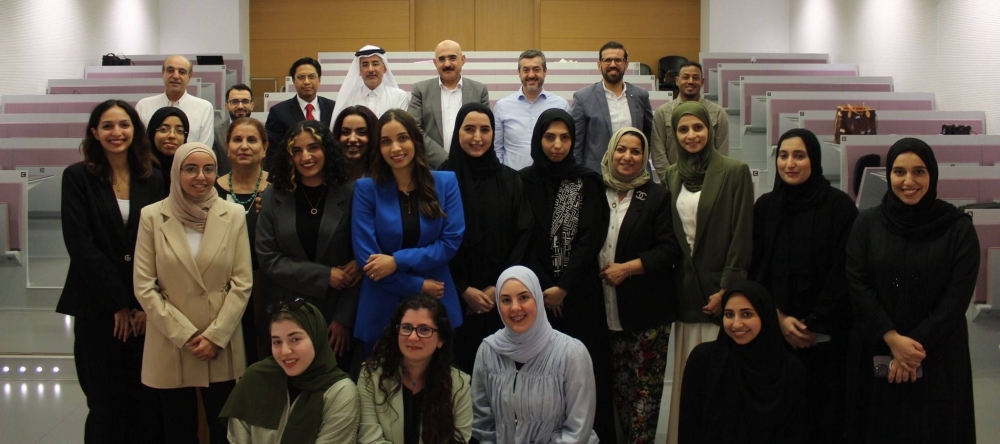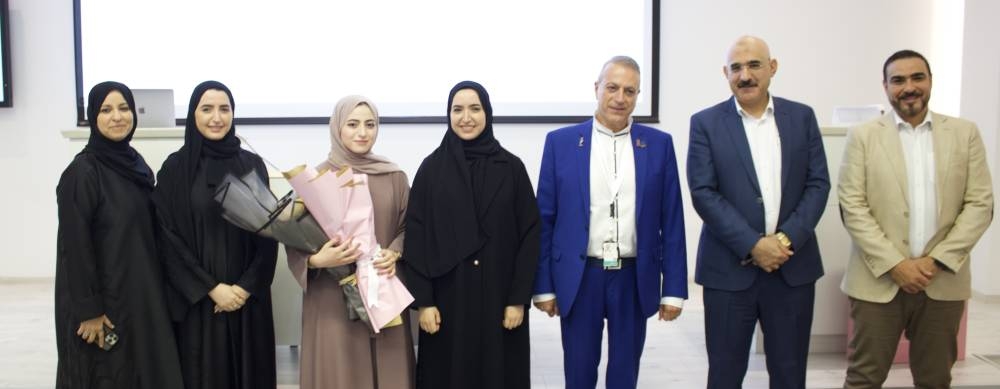The Department of Biomedical Sciences at Qatar University's (QU) College of Health Sciences (CHS) announced the success of its Master's defence presentations, held over two days recently. The presentations showcased the comprehensive research endeavours of 10 students.
Among them, eight successfully completed their master's programmes, with one specialising in the Laboratory Management Track and seven in the Research Track. Two other students showcased their Thesis I Progress Presentations—Research Track, providing insights into their ongoing research projects that they aim to complete by the next term.
Faculty examiners from various health-related clusters, such as the College of Medicine and other health sciences departments such as Public Health, organised the defence sessions. The examination committees comprised both internal members from Qatar University, the Biomedical Research Center, and external experts from leading institutions within Qatar, such as Hamad Medical Corporation, Sidra Medicine and Weill Cornell Medicine - Qatar, as well as from the UK.
The results of a project by Tasneem Hussein al-Hamad, a student in the Laboratory Management Track, could enhance clinicians' ability to diagnose and treat vitamin D deficiencies effectively, potentially improving public health outcomes.
Dr Gheyath Nasrallah and committee member Dr Eleni Fthenou supervised the project.
In the research track, six students presented their projects. Fatima Hassan Ali's study revealed dominant Staphylococcus patterns in later stages of Covid-19 infection, providing crucial insights into microbiome dynamics. The supervisors were Dr Hadi Yassine, along with committee members Dr Hebah A AlKhatib and Dr Maha al-Asmakh.
In the same track, the findings of Ilham Ahmed Ajaj's project, suggest that increasing physical activity and avoiding weight gain can help prevent the transition from metabolically obese to metabolically unhealthy obese, supporting Qatar's national strategy to reduce non-communicable diseases such as cardiovascular disease and diabetes mortality by 36% by 2030. Dr Maha al-Asmakh, in collaboration with committee members Dr Mohsen Mazidi (UK), Dr Richard Webb (UK), Dr Ian Davies (UK), and Dr. Mohamed El-Rayess, supervised the study.
Alaa Ahmed Abdellatif for her project developed a zebrafish model of Gsa deficiency, displaying significant developmental abnormalities resembling human Gsa deficiency and providing a valuable tool for further research into this condition. It was supervised by Dr Mashael al-Shafai, along with committee members Prof Khalid Hussain and Dr Zain Zakaria.
Sondos Abed Alhameed Muneer Yousef's study found that type 2 diabetes mellitus patients had a lower antibody response against certain pathogens compared to healthy individuals, which could inform strategies to enhance protection and reduce morbidity. The project was supervised by Dr Wisam Ibrahim, Dr. Frank Schmidt, Dr Sareena Chennakkandathil, and Dr Sara Taleb.
Asma Allouch's study identified 20 variants with significant implications for modern metabolic diseases, helping to shape preventive measures and guide functional experiments. Dr Rozaimi Razali supervised the project with committee members Dr Mashael al-Shafai and Dr Hatem Zayed.
Using zebrafish and cell-line models, Tara Fathi Abdulazeez al-Barazenji found and confirmed rare missense variants in the PLXNA1 gene, which is linked to severe obesity that starts early. Her work opens new avenues for precision medicine and potential treatments for childhood obesity. Dr Mashael al-Shafai and committee member Prof Khalid Hussain supervised the project. Tara also won the QU-level 3MT competition for her exceptional research.
In the Thesis I Progress Presentations—Research Track, Salma Muhammad Sadeq Ahmad's project showed promising results for treating microbial skin infections using novel hydrogel technology. Dr Gheyath Nasrallah supervised the project, as did Dr. Faleh Marino, a committee member.
Fatemeh Abdullah Mohammad Ahmadi's research showed big differences in genetic variants between modern and ancient genomes, mainly in the SOX5 and TENM4 genes, which could have something to do with how likely someone is to get malaria. The project was supervised by Dr Rozaimi Razali, along with committee members Dr Zilfalil Alwi and Dr Elham Sharif.
The Department of Biomedical Sciences also recently successfully held defence presentations of four students completing their Master of Science in Genetic Counseling degree.
Heba Abdulwahab al-Maghrbi's project highlighted the importance of prenatal whole exome sequencing in diagnosing fetal abnormalities and guiding clinical decisions. The supervisors were Dr. Mashael Nedham A J al-Shafai, Dr Sara Osman Musa, Karen El-Akouri, Maria Farag, Zoulikha Rezoug.
Shahd Mohammad Omar Nasr's study was the first to investigate the underlying genetic causes of cardiac channelopathies in the Qatari population. Pathogenic and likely pathogenic genetic variants were identified in 25% of patients, paving the way for enhanced diagnostic precision and targeted treatment strategies. These findings have the potential to improve clinical outcomes and guide preventive measures in Qatar's population and beyond. Dr Atiyeh Abdalla, along with committee members Dr Mashael al-Shafai, Dr Kholoud al-Shafai, and Dr. Marios Kambouris, supervised the project.
Tala Mohuiddin Jamaleddin's project 'Qatar National Expanded Metabolic Newborn Screening Program: Incidence and Outcomes,' revealed that the overall incidence of inborn errors of metabolism (IEMs) in Qatar to be one in 1,084, with classical homocystinuria being the most prevalent due to a founder variant.
Aminoacidopathies were the most reported category. Genetic testing led to a diagnosis in 87% of cases, offering valuable insights for future research and strategies to reduce the incidence of IEMs and improve outcomes. Dr Mashael Nedham A J al-Shafai supervised the project along with Dr Tawfeg Ben-Omran, Dr Ghassan Abdoh, Dr Osama al-Dirbashi, and Karen El-Akouri.
Salma Bouabidi's study successfully translated and culturally adapted the Genetic Counseling Outcome Scale (GCOS-24) into Arabic, introducing the GCOS-24Qa. After psychometric testing, the GCOS-24Qa will be used to evaluate the effectiveness of genetic counseling services for Arabic-speaking populations in Qatar and potentially other Arabic-speaking regions. Dr Mashael al-Shafai, along with Karen El-Akouri and Reem Bux, supervised the study.


